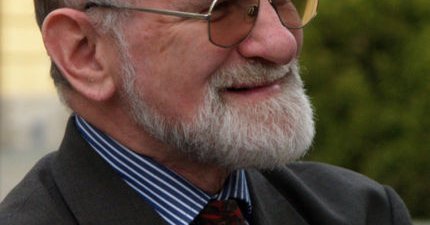A look back at the life of an unforgettable European
Bronislaw Geremek was born on 6 March 1932 in Warsaw to a Jewish family. He knew life in the ghetto of Warsaw and witnessed at the young age of 11 his father’s deportation to Auschwitz where he was eventually killed.
After this painful period, he joined the University of Warsaw where he began studying history. Geremek managed to wend his way to studying in France at the end of 1950s and at the beginning of 1960s found himself attending the Ecole Pratique des Hautes Etudes in Paris. Among other things he was the director of the Centre of Polish Civilization at the Sorbonne. He presented his doctoral thesis in 1972 about the Parisian eccentrics in the XIV and XV century and thereafter became professor of history at the University of Warsaw and a specialist of the European civilization in the Middle Age. He taught from 1965 until 1980. He also loved to teach at the College of Europe in Bruges and Natolin, but this came much later in his life.
Historian, but above all politician and fine negotiator, Bronislaw Geremek was at the forefront of recent Polish history. In 1950 he was member of the Polish Unified Labour Party, the only political party allowed at that point in time; he left their ranks in 1968 during the anti-Semitic purges and during the so-called Spring of Prague. He returned to politics only in 1980 with the participation in the Committee of Defence of the workers during the strike of the shipyards of Gdansk. He was a cosignatory of the agreements of Gdansk between the intellectuals and the workers, which served as a fundament of the Solidarnosc trade union, as he became Lech Walesa’s special advisor. As a victim of the communist repression, he was imprisoned in 1981 for two and half years. It was in 1989, during the Round Table between the Party and the opposition that he participated actively in the transition of his country towards democracy.
Statesman, freedom lover and convinced European, Bronislaw Geremek will remain in our memories as a devoted public servant.
The same year, Geremek was elected as deputy and occupied the offices of President of the Committee on Foreign Affairs in the Polish Assembly. In 1997, he was appointed Foreign Secretary and worked during three years on the question of membership for his country in the European Union. It is under the colours of the party which he founded in 2001, Unia Wolnosci - Partia Demokratyczna (Union of Liberties - Democratic Party) that he was elected as Member of the European Parliament in 2004 in the first European election of the newly enlarged EU with his home country Poland as equal member.
However, he failed to become President of the European Parliament in front of Josep Borell, despite collecting more votes than the number of MEPs of the two parliamentary groups that supported him: the European Greens and the liberals ALDE.
We shall also remember the fight he waged against the Polish lustration law imposed by the Kaczyński twins in 2007, never backing down, even as threats that he would be discharged of his post as Member of the European Parliament spell forth. The European Parliament supported him ardently in his cause. Some months later, the Polish Constitutional Court announced the illegality of the measure.
Awarded numerous distinctions throughout his life, such as the International Price Charlemagne for his commitment to the European unification, he was also made, in France, Officer of the Legion of Honour and Commander of the National Order of Merit.
He was also, among other things, President of the Organisation for Security and Cooperation in Europe. Geremek also presided as president of the Jean Monnet Foundation for Europe as well as the Foundation in 2002 of the College of Europe in Natolin near Warsaw.
The most European of Poles
Diplomat, freedom lover and convinced European, Bronislaw Geremek will remain in our memories as a committed man. He is doubtless the most European Pole to grace our memory. He merits this honor because of his personal history, his deeds and his words. We remember his statements on the occasion of the event États Généraux de l’Europe less than a month ago on June 21st in Lyon where he had presented with a lot of vigour his affiliation with the European Union alongside the President of the Italian Republic, Giorgio Napolitano. Geremek had explained that the European Union represented for him a chance as a citizen of a former country of the Eastern bloc. He had reminded us all of the importance of the four basic freedoms, especially the free movement of people: “this tremendous capacity to cross the borders” which was unthinkable some 20 years ago in Poland.
Bronislaw Geremek will remain a monument for Poland and for Europe, for transmission of the values of peace and the respect for the rule of law, for his enduring humanity, for his fight to obtain pluralism and civil liberties. The work of his life is the one of democracy and a united Europe - as such, the Young European Federalists will miss him and carry on in his spirit.



Follow the comments: |
|
